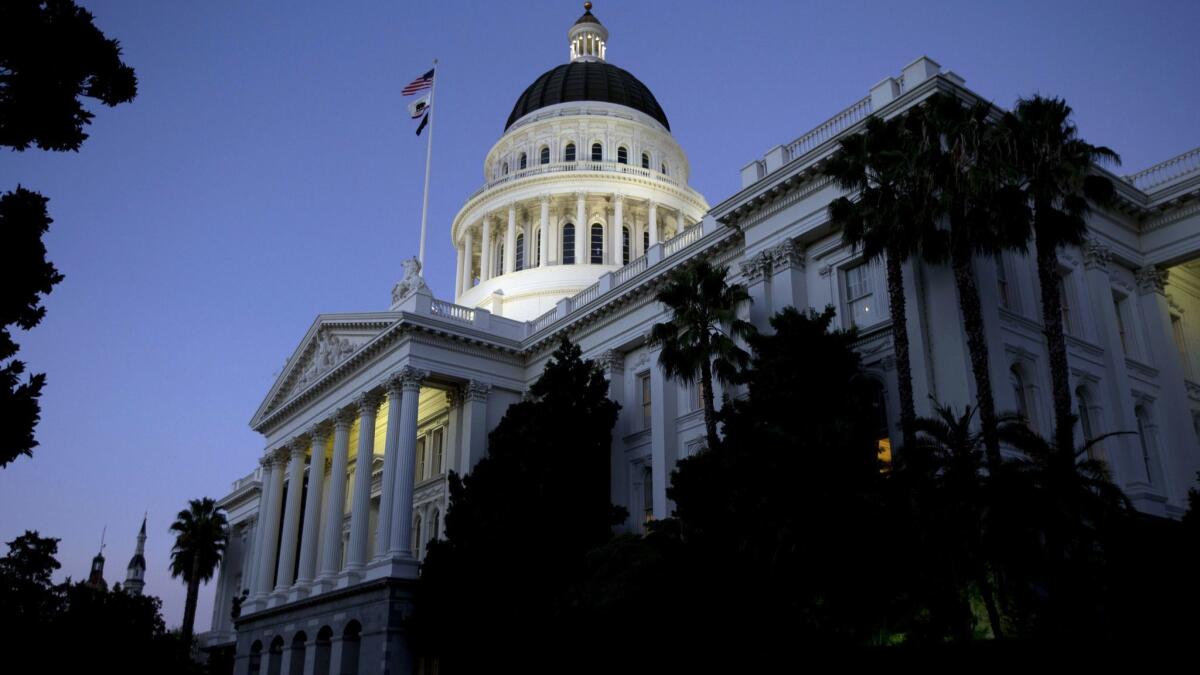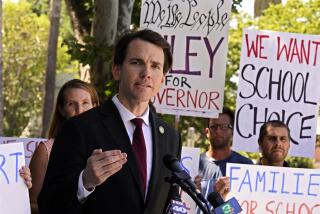California’s campaign watchdog agency could soon lower fines for many political violations

Fewer politicians and campaigns would face significant financial penalties for breaking California campaign and ethics laws under a proposal that could soon be adopted by the state’s political watchdog agency.
At the same time, a group of attorneys representing political campaigns is pushing for the state Fair Political Practices Commission to go further — by settling more violations with warning letters instead of fines.
The agency’s new proposal to expand the number of cases eligible for a lower fine under a streamlining program is under review by open-government groups that worry changes could weaken a tool used by the commission to discourage wrongdoing.
“There are legitimate uses of streamlining, but we want to ensure the proposed penalty structure does not eliminate important deterrents to violators,” said Kathryn Phillips, a spokeswoman for California Common Cause.
The commission is scheduled next week to consider expanding its longstanding Streamline Settlement Program, which allows the agency to impose smaller fines when it finds mitigating factors, such as situations in which the violation is the politician’s first offense.
Other factors include findings that the violation was inadvertent, or a determination that the politician is inexperienced or that the public harm done is minimal, possibly because the funds involved are small or the candidate did not win.
While many violations of campaign finance and ethics laws carry a fine of up to $5,000, the commission’s streamlining program allows the agency to impose small fines, many at $100 to $200 per offense, for “violations with a lesser degree of public harm,” according to a staff report to be given a public hearing by the commission on Thursday.
The idea behind the program is to allow quicker processing of smaller cases so the FPPC enforcement staff can focus on more serious violations in which politicians knowingly break the law.
Commission Chairman Alice Germond said campaigns sometimes make mistakes, and the proposed change “eliminates the ‘gotcha’ in favor of a clear understanding of the penalties.” She added that “the FPPC wants to make it easier for Californians to participate in government at every level,” and expediting the enforcement of violations helps.
Coverage of California politics »
The program currently allows streamlined settlements with minimal fines for public officials who fail to file annual reports disclosing their financial interests, campaigns that don’t report their fundraising and spending, and lobbying firms and clients that don’t disclose who they are lobbying, on what and for what amount of money.
The FPPC’s Enforcement Division, headed by Galena West, has broad discretion to decide which cases are included in the streamlining program, based on certain standards. Factors that might keep a case out of the program include a history of prior violations, or evidence that a person intended to conceal information from the public.
Currently, people who don’t properly file campaign finance reports or lobbyist disclosures when more than $25,000 has been spent are not eligible for lower fines. But West is proposing that campaign and lobbyist violations involving up to $50,000 be included in the streamlining program.
She is also proposing to make an additional 12 categories of cases eligible for lower fines, including violating limits on accepting gifts, failing to disclose who is behind advertising and mass mailings, accepting excessive cash contributions and failing to report and avoid official action involving conflicts of interest.
Currently, those violations could result in fines of up to $5,000.
If mitigating circumstances are determined to exist with those violations, the new regulations would require fines of $200 or less for accepting a gift over the limit, $100 or less for failing to report a financial interest and $400 or less for a public official who does not recuse himself from actions when facing a conflict of interest.
Trent Lange, president of the California Clean Money Campaign, said many of the proposed changes look reasonable, but criticized an effort to make lobbyists and campaigns that spend more than $25,000 eligible for lower fines.
“There are several of them that are very worrisome because they could allow large actors to get away with making the kinds of large-dollar violations to reporting and advertising disclosures, that could sway elections, with nothing more than a slap on the wrist,” Lange said.
Many of the changes recommended by the FPPC staff were first proposed by the California Political Attorneys’ Assn., a group of lawyers who represent politicians and campaigns in their dealings with the FPPC.
“I think they go a long way to bring clarity to the enforcement process and specifically with respect to streamlined enforcement and the warning letter process,” said Brian Hildreth, an attorney with the association who also serves on a task force created by the FPPC to recommend changes to the agency’s enforcement program.
The task force is chaired by Stephen J. Kaufman, who is also a member of the political attorneys group, which has also asked the FPPC to expand the number of cases settled with warning letters rather than fines.
The attorneys are targeting the hundreds of cases that result in fines when an audit by the Franchise Tax Board finds violations in how money is reported and spent.
“A number of cases that arise from minor [Franchise Tax Board] audit findings should be resolved with warning letters,” the group said in a letter to the commission.
The attorneys association also urged the commission to allow candidates and committees that receive contributions over state limits to avoid penalties in some cases by forfeiting the donations.
“Disgorgement within certain time parameters should be a cure for over the limit contributions,” the group wrote.
Kaufman said fairness dictates that the enforcement process be changed so that punishment is proportional to the offense.
“The goal would be to let the commission focus on the major types of violation that warrant full enforcement and allow the less significant violations, the garden variety, everyday violations that occur in every campaign, to be handled at a much lesser level,” he said.
Twitter: @mcgreevy99
More to Read
Get the L.A. Times Politics newsletter
Deeply reported insights into legislation, politics and policy from Sacramento, Washington and beyond. In your inbox three times per week.
You may occasionally receive promotional content from the Los Angeles Times.







